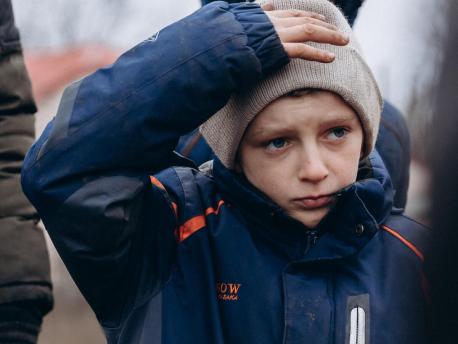
War in Ukraine: Support Children and Families
One year after the escalation of war in Ukraine, a look at the impact of UNICEF's ongoing relief efforts for children and families.
As the escalation of war in Ukraine reaches the one-year mark, devastation and destruction continue during a long and bitter winter. Children have been killed, injured, separated from their families, forced to stop learning, and borne witness to extreme levels of violence.
The devastation has been extensive, and children still face many grave threats to their health, safety and well-being.
Since Feb. 24, 2022, 438 children have been killed and 842 children have been injured, according to verified reports, though the actual number is likely higher.
Many children have been separated from caregivers. They've witnessed extreme violence, and have lost their homes, schools and neighborhoods. Many have gone months without hearing from their parents, left hoping they are still alive.
The number of children living in poverty has almost doubled to more than 80 percent in the past year. Essential services that children and families rely on to survive have been decimated. Damage to critical infrastructure has disrupted the water supply, left homes without power or heat in the middle of winter and made it difficult to access basic health care.
Over 5 million children face barriers to continuing their education — including 3.6 million children directly affected by school closures.
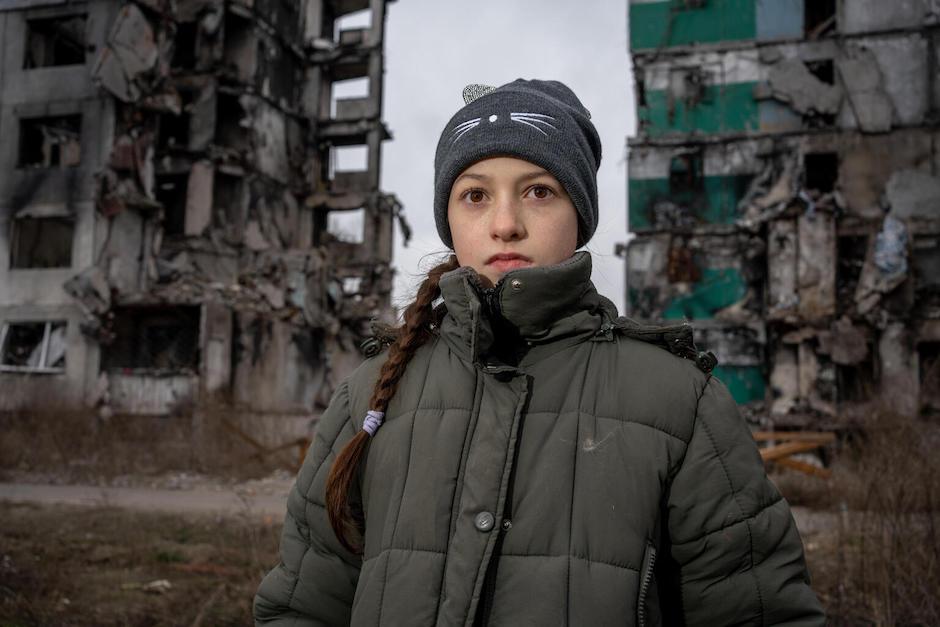
What is UNICEF doing to help children and families in Ukraine?
As conditions inside Ukraine continue to deteriorate, UNICEF continues to deliver emergency relief, including winter gear; generators and heating for schools and hospitals; medical supplies, including vaccines; mental health and psychosocial support; and humanitarian cash transfers to help vulnerable families cover basic needs.
UNICEF is also working with partners to scale up health and protection services, restore community water and sanitation systems, and help kids continue with school.
So far, UNICEF has supported 1.5 million children with access to formal or non-formal education, including early learning — working with the government and other partners to find ways to give children opportunities to study, engage and interact where formal classroom learning is not possible.
UNICEF Ukraine Representative Murat Sahin emphasized the importance of education — so critical to children's well-being and social development — as a key component of UNICEF's emergency response to the war and its impacts. Every child has a right to a quality education in a safe environment, Sahin said.
"Education provides children with much more than just knowledge," Sahin said. "It is a lifeline for them. Schools give children a sense of normalcy and hope. The sooner children will be able to return to a school environment, to have their normal routine, to learn and interact with classmates and teachers, the faster they can recover – particularly the most vulnerable children."
Sahin also noted that education can be an "entry point" for delivering other critical services — including psychosocial support. With partners, UNICEF has reached nearly 3 million children and caregivers with mental health or psychosocial support inside Ukraine since February 2022.
Donor support is crucial to UNICEF's Ukraine response
Through other emergency interventions UNICEF has also:
- enabled access to safe water for over 4.6 million people living in areas where water systems had been damaged or destroyed, and provided water, sanitation and hygiene supplies to nearly 1.6 million people
- helped almost 5 million children and women — including new and expectant mothers and their babies — access primary health care
- reached more than 402,000 people (over half of them children) in 22 oblasts with essential health services through home visits and mobile teams of doctors, nurses and psychologists
- provided multi-purpose humanitarian cash transfers to nearly 310,000 households to help vulnerable families cover basic needs
- distributed 800 power generators to support provision of safe drinking water, water for heating systems, medical facilities and other essential infrastructure
- distributed winter clothing and other winter supplies to approximately 500,000 children and families since September
- helped rehabilitate 11 schools or school shelters in Kyivska and Zhytomyrska oblasts benefiting over 8,500 children and beginning rehabilitation work on another 53 schools
UNICEF continues to work around the clock to scale up lifesaving programs for children and families impacted by the war. Here's a closer look at the impact of some of those programs.
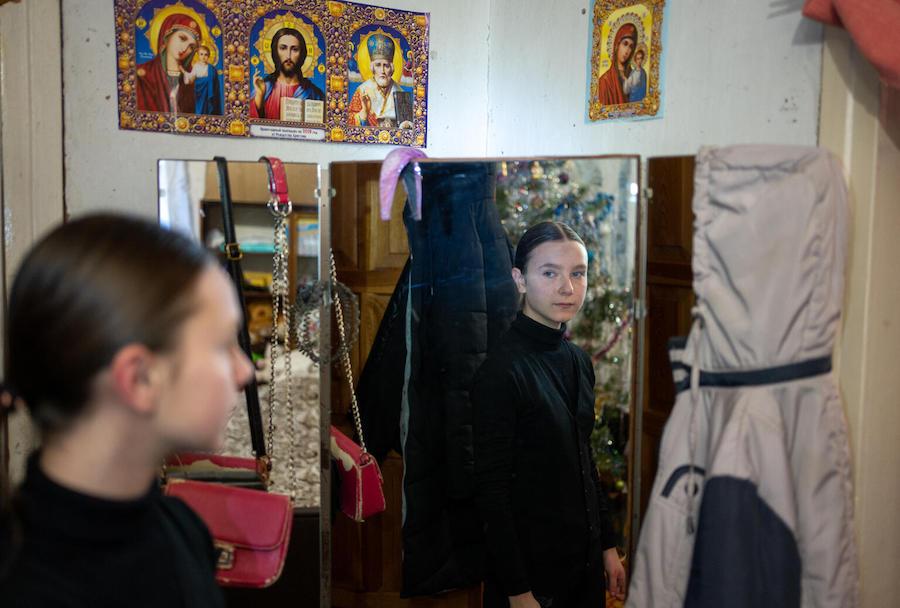
Providing psychosocial support to youth recovering from trauma
As war rages on inside Ukraine, UNICEF mobile support teams are helping children and families cope with the fallout — meeting them at service centers if they remain displaced by fighting, and traveling into communities where residents have returned and are trying to rebuild their lives.
Each UNICEF-supported multidisciplinary mobile team includes a psychologist, a social worker, a lawyer and a doctor. There are both in-person and remote consultations.
In Izyum, a city in Kharkiv oblast in eastern Ukraine, an estimated 70 percent of homes are damaged and water and utility services are unstable. Svitlana, a doctor with one of UNICEF's mobile teams, says her team meets with about 150 families in Izyum every month.
"Many families in Izyum are left without even the basics and they cannot deal with it on their own," Svitlana says.
"Children who have experienced severe shelling often need the help of a psychologist. Their moms and grandmas, who were left without medicines and not able to visit doctors, have to be referred to doctors. Many of them need support in registering for social assistance."
Dasha, 15, says the weekly visits from a UNICEF team psychologist are helping her process her feelings of tension, indifference and anxiety — and restoring her hope for the future.
“I realize that it was caused by the war, but it's hard to figure it out without expert advice," she says. Read Dasha's story here.
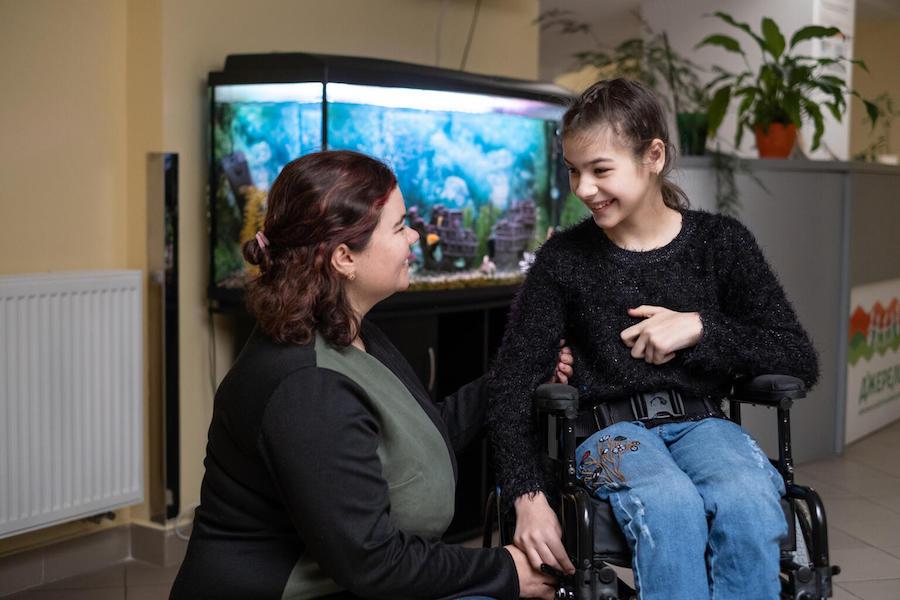
Prioritizing the most vulnerable — including children with disabilities
The war in Ukraine has been especially hard on children living in institutions and children with disabilities. UNICEF is working to ensure children with disabilities have access to the essential services they need, despite the war.
The 2.9 million children and caregivers UNICEF has so far reached with mental health support — online or in person — includes nearly 354,509 children with disabilities.
After 4-year-old Theona, who has autism spectrum disorder, and her family were forced to flee their home in Kherson, her parents had to find a new support system. They were able to receive help from specialists at a UNICEF-supported Dherzelo Children's Rehabilitation Center in Lviv, where they resettled.
When 11-year-old Margaryta and her family moved to Lviv, the same rehabilitation center provided her with the wheelchair she needed. Margaryta's new chair has given her a sense of independence again, allowing her to meet other people, go to school and give her brother a hug. The center has currently received over 185 wheelchairs for children with disabilities.
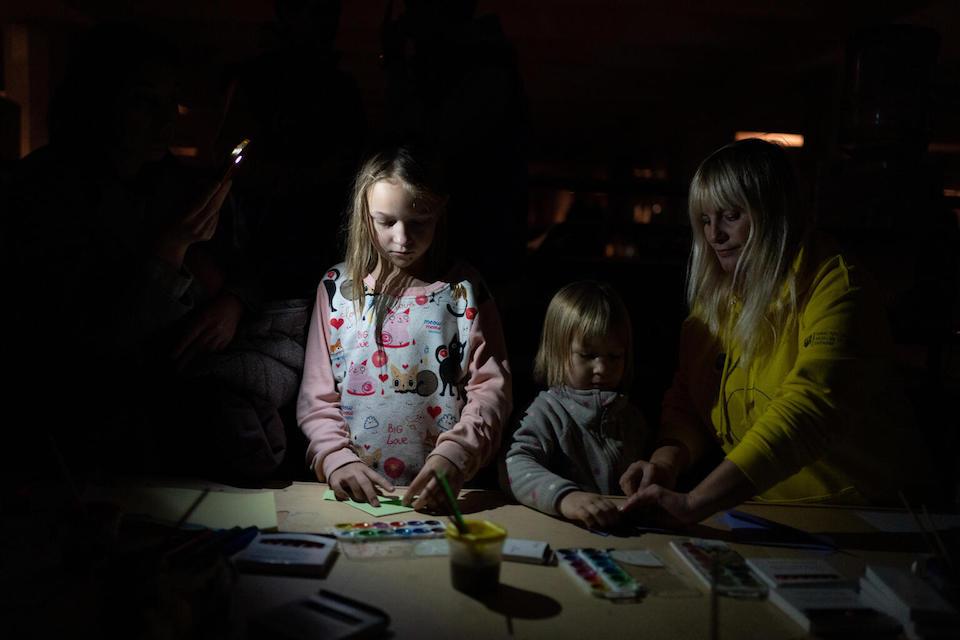
Creating spaces for displaced children to learn and play
As conflict in Ukraine escalated nearly a year ago, children were forced to shelter underground to stay safe from harm. Thousands of children ended up in the Kharkiv subway station.
So UNICEF worked with volunteers to set up a temporary school in the station, where teachers could provide some instruction and psychologists could offer mental health support. The safe space also gave children a place to play games, take art classes and engage in other fun activities.
The 'Spilno' (Ukrainian for 'together') centers that UNICEF is supporting all across the country are an extension of that same idea — providing multi-purpose spaces where out-of-school children can get back to learning in a safe environment and where they and their families can also receive mental health support, protection and other services.
There are 182 Spilno centers offering integrated services; between May and December 2022, nearly half a million children and caregivers visited one.
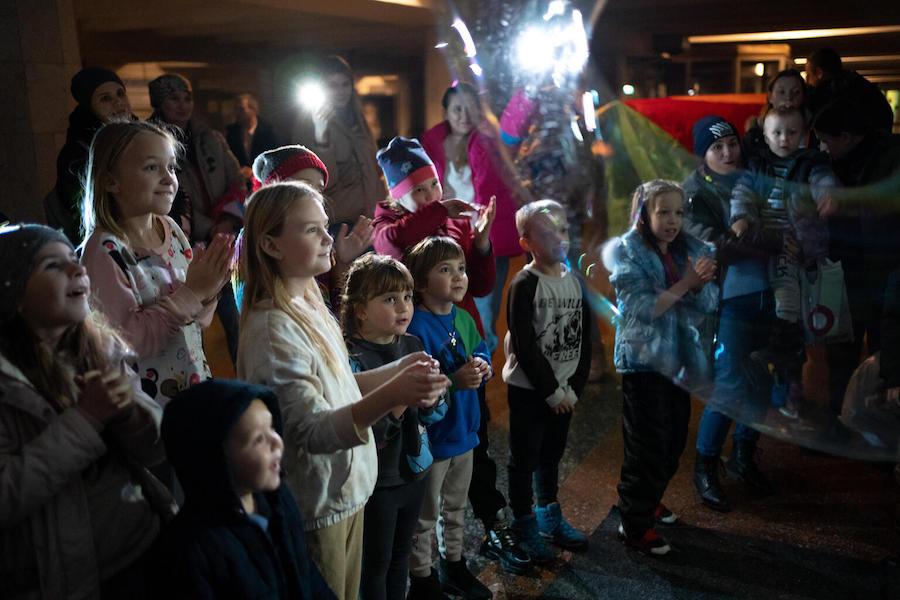
Helping Ukrainian refugees in neighboring countries
An estimated 5.9 million people are displaced inside Ukraine. Another 7.9 million refugees — 90 percent of them children and women — have fled to neighboring countries.
UNICEF’s Ukraine war response outside of Ukraine — initially focused in six border nations — has since expanded to 19 countries that are hosting Ukrainian refugees, where UNICEF is supporting governments to ensure access to services, protection and social assistance.
This includes providing anti-trafficking training for border guards, expanding learning opportunities and integrating refugee children into local schools, procuring vaccines and medical supplies to support local health care service delivery, and establishing play and learning hubs that provide young children with a much-needed sense of normalcy and respite.
Working with partners in neighboring countries, UNICEF and partners have:
- provided mental health and psychosocial support to over 846,000 children and caregivers
- supported national ministries of health to help refugee women and children get health services including vaccinations
- distributed hygiene supplies and helped set up facilities to support improved hygiene ahead of the winter season
- helped nearly 89,000 children access formal or non-formal education, including early learning, and distributed learning materials to over 448,000 children
- reached more than 10.5 million people with lifesaving messaging about their rights, how to stay safe and how to get help
UNICEF has also been working with UNHCR, along with local authorities and other partners, to establish and operate 'Blue Dot' service centers for refugee children and families. There are 40 UNICEF-UNHCR Blue Dot hubs operating at key border and transit locations providing temporary shelter, information and other support.
So far over 732,000 refugees have benefited from UNICEF-supported safe spaces and nearly 434,000 women and children have accessed primary health care with UNICEF's help.
Learn more about UNICEF’s Ukraine and Refugee Response 2023 Appeal, which contains details about UNICEF's strategy and plans to meet immediate and long-term needs of 9.4 million people, including 4 million children.
UNICEF continues to stay and deliver for the people of Ukraine — and remains committed to working with partners to support children and families through the war and beyond. Support UNICEF's emergency response efforts in Ukraine and around the world. Your contribution can make a difference. Donate today.
HOW TO HELP
There are many ways to make a difference
War, famine, poverty, natural disasters — threats to the world's children keep coming. But UNICEF won't stop working to keep children healthy and safe.
UNICEF works in over 190 countries and territories — more places than any other children's organization. UNICEF has the world's largest humanitarian warehouse and, when disaster strikes, can get supplies almost anywhere within 72 hours. Constantly innovating, always advocating for a better world for children, UNICEF works to ensure that every child can grow up healthy, educated, protected and respected.
Would you like to help give all children the opportunity to reach their full potential? There are many ways to get involved.





